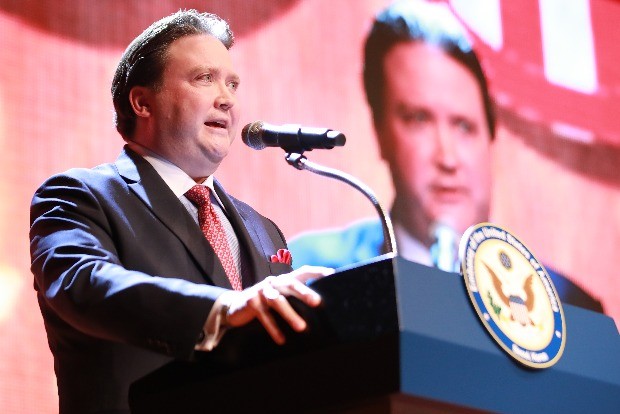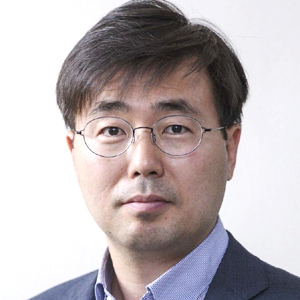Posted on : Dec.14,2018 16:35 KST
 |
|
Acting Deputy Assistant Secretary of State for East Asia Marc Knapper
|
In a speech at the Korea Foundation’s end-of-year party in Washington, DC, early this month, acting Deputy Assistant Secretary of State for East Asia Marc Knapper said that a “lot of good things are happening” in terms of changes on the Korean Peninsula over the past year.
“We’re expecting a second North Korea-US summit, and we’re also looking forward to a Seoul visit by [North Korean leader] Kim Jong-un,” he added. When the time came for separate questioning from reporters, he slipped off, an impish expression on his face. The question at the time was whether any news would be forthcoming before the end of the year between Seoul and Pyongyang or between Pyongyang and Washington. But the Blue House would later openly state that Kim’s visit was unlikely to come before the end of the year, and no activity has been detected between North Korea and the US.
In contrast with the major attention given over in South Korea to the matters of Kim’s visit and talks between Pyongyang and Washington, the issues have not drawn much attention from the US press or public. Underlying this is a widespread sense of strong skepticism and pessimistic attitudes on North Korea-US dialogue. The skepticism in the US shows little hint of dying day, combining as it does with distrust toward the North and sentiment opposing the Donald Trump administration.
Whereas the North Korea issue exists in the South as a dividing line between progressives and conservatives, there’s a broad consensus in the US across all political and philosophical persuasions that the North “hasn’t changed” and that Trump is “being played.”
One of the reasons skepticism and pessimistic prevail is because they’re safe bets.
“You’re never going to get criticized for speaking critically about North Korea-US relations,” a US expert on Korean Peninsula affairs told reporters.
“If things go well between North Korea and the US, you just say, ‘It’s a good thing and I was wrong about that.’ But if you’re optimistic and you get proven wrong, you get blasted. ‘Look at that. You’re so naive,’ they’ll say.” This explains why people feel comfortable with a conservative stance on most North Korea issues.
As the deadlock drags out between Pyongyang and Washington, something even more troubling than skepticism or pessimism has been emerging: apathy. With no new developments in the situation, the US press is scarcely talking about the Korean Peninsula. The domestic situation faced by Trump is only contributing to the lack of interest in Korean issues. Investigations and trials targeting him – including the scandal involving Russia – are reaching a fever pitch, while the Democratic Party is gearing up for congressional investigations into various policies and allegations as it takes over as the majority party in the House on Jan. 3. Trump’s Twitter feed is focused mostly on domestic political issues. One US betting site is already making predictions that Trump is likely to lose his re-election bid in 2020.
In foreign policy terms, US experts rated Korean Peninsula issues as “fourth or fifth” on the Trump administration’s priority list, after China, Russia, and Iran. While Trump proclaims that the North Korean nuclear program and missiles no longer pose a threat and that he is on good terms with Kim Jong-un, many experts predict he could focus for now on maintaining the status quo.
“Hopefully, Kim Jong-un will take his chance before Trump’s position becomes more uncertain and North Korea issues get pushed further on the back burner,” said a former high-ranking South Korean government official who recently met US figures in Washington.
 |
|
Hwang Joon-bum, Washington correspondent
|
Ultimately, the important thing is that Pyongyang and the US continue working to build something. While some in the US may be declaring it time for the Trump administration to concede, even people who hold that opinion say that the faster way realistically would be for North Korea to take additional action toward denuclearization. Internally, the US finished much of its examination of corresponding measures for the North Korea around the time of the two sides’ first summit in June; progress could occur if North Korea takes another small step forward, they argue. If the two sides exchange signals and produce some kind of result, the skepticism and apathy surrounding North Korea-US relations will recede somewhat.
By Hwang Joon-bum, Washington correspondent
Please direct comments or questions to [english@hani.co.kr]








